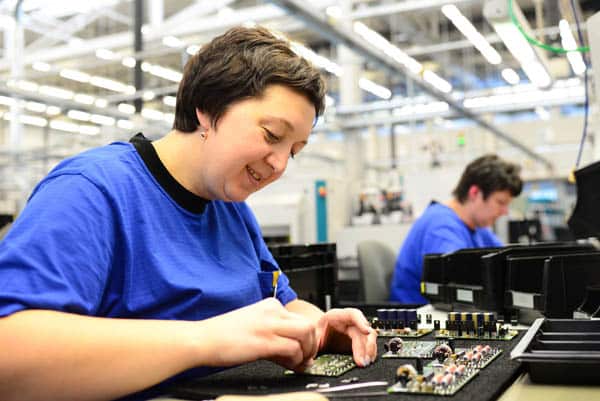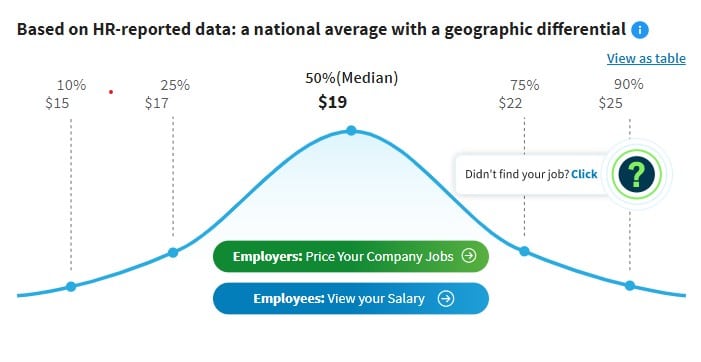Production line work is fast-paced and challenging, and for the right person, it can be an incredibly rewarding career. Read on to find out more about what production workers do and see if a production line job could be right for you.
Bonus: we’ll give you some tips that will put you in a position to get hired quickly and be successful at production line work.
What sector do production workers work in?
Production workers work in manufacturing. The manufacturing sector plays a vital role in the United States economy. It is one of the largest employers and is responsible for a significant amount of the country’s output. Manufacturing is an essential driver of economic growth, and it is poised to continue its expansion in the years to come.
American manufacturing has always been at the forefront of technology. From the country’s early days, when American manufacturing innovations helped shape the nation with inventions like the assembly line, to today, when new technologies, such as robotics and 3D printing, are continuing to push the boundaries of what is possible.
What do production line workers do?
Most simply put, production line workers work together on assembly lines to build different products. They frequently work on industrial machinery using a variety of materials, depending on the product being fabricated.
Production line workers might be assemblers, putting together finished products using tools and machinery, or they could be fabricators, working to make the individual parts that will come together to create a finished product. Production work could be making anything from aircraft engines to electronic devices or even children’s toys.
Essential skills for production workers
If you’re looking for a job on a production line, you’ll likely need to have (or develop) some of the following skills: the ability to read and understand blueprints or schematic diagrams; to use hand tools or heavy machinery to assemble parts; to conduct quality checks and to maintain a clean and safe working environment.
This last part is underrated but perhaps the most important part of production work. Maintaining a safe working environment is an essential part of production work. Production positions require long hours of standing and the constant use of safety equipment, such as helmets and ear and eye protection. A full eight-hour shift can be physically demanding, and applicants should be in good physical condition to flourish in such an environment.
Many production lines request that workers have at least one year of experience in a similar position to show that they will have no difficulty spending an entire shift on their feet, lifting at least 50 lbs., and following step-by-step instructions to detail. While candidates with previous experience operating tools or machinery will stand out, those skills can be taught to the right person.
Production lines aren’t all about brute force, however. Technological advances have changed the manufacturing industry, allowing for the use of programmable robots, computer systems, and motion-control devices in the assembly process. Candidates working with these technological systems might be eligible for advanced assembly positions managing these technologies to assemble final products.

Do I need a degree to work on an assembly line?
While a degree is not strictly necessary to work on an assembly line, most employers will ask that any candidates for a production job hold at least a high school diploma or equivalent. Further training for entry-level hires is often provided upon contract. However, workers with experience in similar roles may be eligible for shortened training periods and even start at a higher pay grade.
There is one caveat: some production positions require an associate’s degree or specialized training courses, as is the case with advanced assembly or fabrication jobs. This is especially true when the final product being produced is an aircraft, motor vehicle, or piece of electronic equipment. For workers looking to grow within their careers, employers may often offer apprenticeship programs where line workers can be trained for assembly jobs.
Each production line job will require different skills, so keep in mind that you may be a more qualified candidate for one industry over the other. To get hired more easily, you should tailor your resume to highlight different skills for each industry you’re applying to.
Production workers: soft skills
Anyone who has worked in a formal environment knows that a successful worker doesn’t just have job skills. They also have soft skills, which often refer to how they relate with other people in the work environment.
A quality production worker should be able to communicate both verbally and in writing with coworkers and supervisors; solve problems or resolve conflicts should they arise; work well with others or in teams, and learn new skills as they become relevant to their job.
Production workers also need to be detail-oriented, able to quickly spot defects in a product before it’s completed, and responsible for their own safety and that of their colleagues, efficiently following strict health and safety guidelines. Deadlines are important on a production line and keeping a work area clean and safe doesn’t just help to avoid accidents – it also improves the efficiency and quality of the production line.

How much do production workers make?
According to the Bureau of Labor Statistics, in the U.S., the mean annual wage for a production worker is $36,230. Indeed.com says the average hourly wage for production work is $16.43 per hour. Salary will vary based on experience, education, company size, industry, and market. Some manufacturing companies also give monthly or quarterly competitive bonuses. Healthcare benefits and retirement plans are also available from many manufacturing employers.
Our economy depends on production work.
The next time you’re at the store, look at the products on the shelves and think about all the people who helped to get that product to you. Chances are, there were many different types of workers involved in getting that one item from start to finish, each with their own specific set of skills and training necessary for completing their part of the process. Production line work can be demanding and challenging, but it’s also essential to keeping our economy running smoothly.
Learn more about our staffing services:
- CDL Drivers
- Productions Workers
- Warehouse Workers
- Strike Replacements
- Assembly Line Workers
- Temporary Staffing
- Manufacturing Staffing









